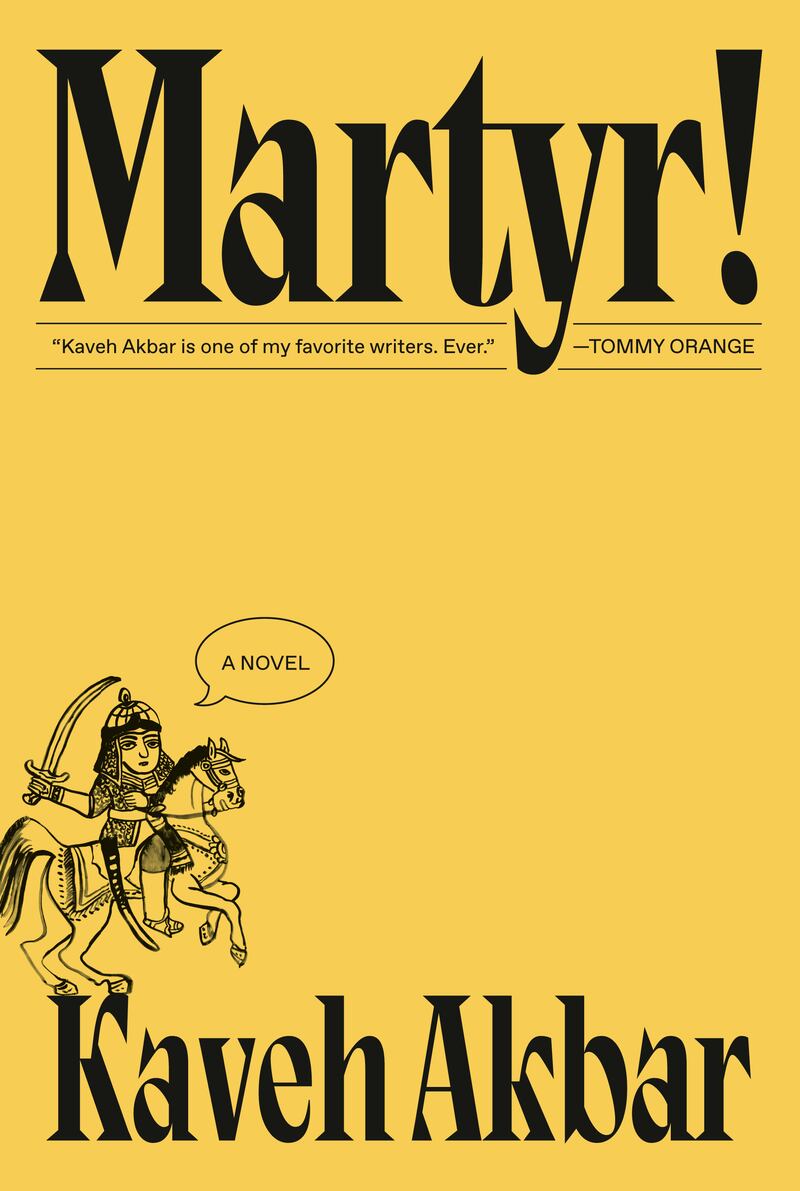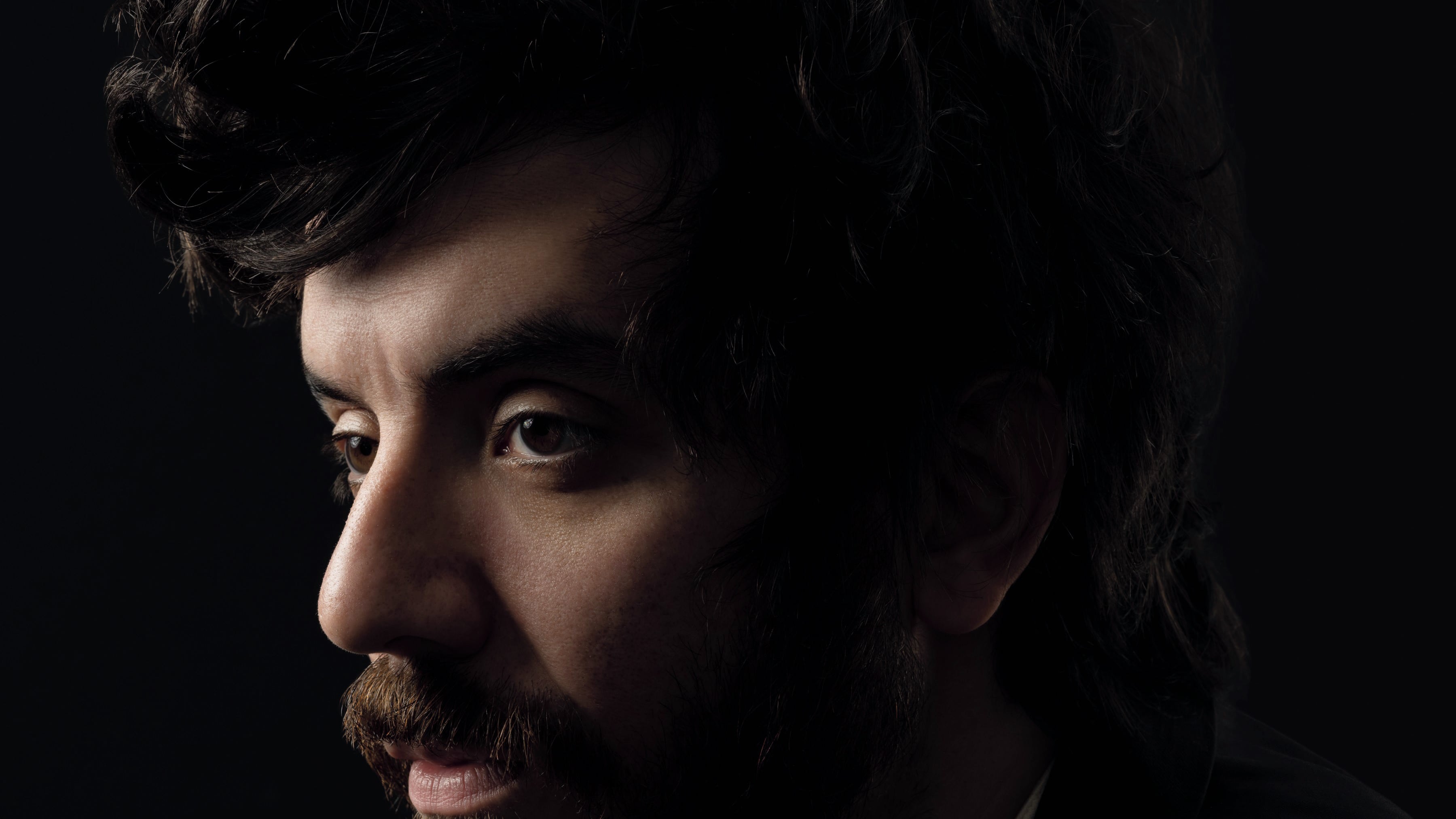The cover of Kaveh Akbar’s debut novel, Martyr! (Knopf, 352 pages, $28), is a perfectly cheeky representation of the text within: an exclamation point in the title and an illustration of an Iranian soldier with a wry expression and a speech bubble declaring, simply, “A novel.”
Aside from judging this book by its cover, another judgy metric is the fact that this novel’s author is a poet. From Ocean Vuong to Michael Ondaatje, I often say that poets write the most beautiful novels, and Martyr! is no exception.
Told in shifting perspectives and times, the story centers on a young poet named Cyrus Shams. While the newly sober, newly orphaned son of Iranian immigrants grapples with the point of his life—and the point of staying alive—he becomes obsessed with the idea of martyrdom, of death with a purpose.
How can he have a meaningful death? Whose deaths are meaningful? In the midst of his obsession, which somehow manages to be funny and relatable, Cyrus learns that an Iranian artist named Orkideh is doing a Marina Abramović-esque performance at the Brooklyn Museum (inspired by Abramović's Museum of Modern Art exhibit The Artist Is Present). After learning she has terminal cancer, Orkideh has decided to live her final days in the museum, where thousands of people come to sit across from her and ask questions, give thanks or, often, just cry.

Akbar, whose poetry has appeared in The New Yorker and The Paris Review, was used to “holding the reins loosely and allowing the words to lead me to other words.” After publishing several collections—Calling a Wolf a Wolf, Pilgrim Bell and the chapbook Portrait of the Alcoholic—writing a novel was unfamiliar territory.
“I didn’t want to assume the hubris of just doing it without, you know, paying very close attention to how it’s been done for centuries,” Akbar tells WW.
During the COVID-19 quarantine, Akbar became a self-guided scholar of plot, committing to reading two novels a week and watching one film a night. He studied everything from Agatha Christie to pulp sci-fi; John Cheever to Toni Morrison; horror films ranging from The Taking of Deborah Logan to The Shining. “I’d watch Antonioni one day and Pineapple Express the next,” he says with an excited smile.
As he studied the art of storytelling, Akbar became fascinated by narratives that failed to command his attention.
“You know that feeling when you’re in the theater and you’re like, God, how long is this movie?” he asks. “When those moments would happen in a novel or in a movie, I would pay really close attention to what was happening and what wasn’t happening, because the novel that I’ve written moves all around in time…and there’s a lot of opportunity for slackness to accrue or for confusion to accrue.”
While Akbar knew that a big component of the book would revolve around Orkideh’s performance, he quickly realized that the artist on her own wasn’t narratively interesting.
“I had to find an equally interesting story to tell about the person to whom she was talking,” he says. “So that is how Cyrus came to be, and then I sort of retroactively fashioned the superstructure around them.”
Akbar also knew that he wanted to center part of the story on the 1988 Iran Air Flight 655 disaster, in which an Iranian airliner was shot down by the USS Vincennes, killing all 290 people on board. That disaster serves as a precipitating event for a lot of the action in the book.
Another core theme is Cyrus’ addiction and recovery, which is a defining part of Akbar’s personal story. “It dominates a huge part of my consciousness and many hours of every day of my life,” Akbar says.
Akbar describes weaving these narrative threads together as being like “finding a way to make all of these sock puppets talk to each other.” After hundreds of drafts, the structure slowly revealed itself to him, and after about five years, he completed the book.
Ultimately, Akbar’s plot studies paid off. From the spectacularly non-cliché dream sequences featuring Kareem Abdul-Jabbar and a 2D Lisa Simpson to shifting perspectives and eras, Martyr! is humbling, hilarious and otherworldly.
Reflecting on the question of how long he spent writing Martyr!, Akbar says that while it took five years, “There are little riffs and drafts and beats from old poems and old little paragraphs that I’ve written here and there that are much, much older than those five years so, I mean, the honest obnoxious answer is like, 35 years, you know? My whole life.”
GO: Kaveh Akbar appears in conversation with Portland writer Karen Russell at Powell’s City of Books, 1005 W Burnside St., 800-878-7323, powells.com. 7 pm Friday, Feb. 2. Free.
